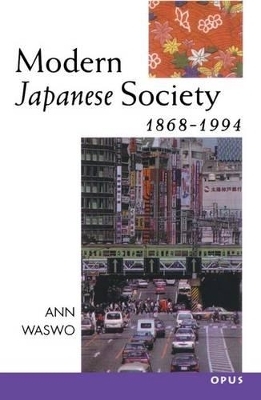
Modern Japanese Society 1868-1994
Seiten
1996
Oxford University Press (Verlag)
978-0-19-289228-7 (ISBN)
Oxford University Press (Verlag)
978-0-19-289228-7 (ISBN)
The 20th century has been a time of tremendous social change and development in Japan. This study outlines the role of the ordinary Japanese citizen in modern Japanese history, exploring the rapidly altering relationship between the state and its people.
The last 120 years have seen great social change and development in Japan. In the early 1870s Japan was still a third world country - a newly unified island nation with a highly agrarian economy and an insecure and weak government. By 1914 Japan has progressed towards the beginnings of an industrial economy, it had established a small empire for itself and the government had gained full and effective control over the entire country. Now, at the end of the twentieth century, Japan is an economic giant, with a massive export economy and considerable clout in the international world community.
Ann Waswo outlines the role of the 'ordinary' Japanese citizen in this extraordinary history. One of the continuous themes in this history has been the steady relationship which the state has had with the people since the late nineteenth century, but this relationship has not been without change. Waswo focuses attention upon these developments, together with the many historical explanations for events in Japanese history - events which have too often been explained by the 'unique and enduring' quality of Japanese cultural traditions.
The last 120 years have seen great social change and development in Japan. In the early 1870s Japan was still a third world country - a newly unified island nation with a highly agrarian economy and an insecure and weak government. By 1914 Japan has progressed towards the beginnings of an industrial economy, it had established a small empire for itself and the government had gained full and effective control over the entire country. Now, at the end of the twentieth century, Japan is an economic giant, with a massive export economy and considerable clout in the international world community.
Ann Waswo outlines the role of the 'ordinary' Japanese citizen in this extraordinary history. One of the continuous themes in this history has been the steady relationship which the state has had with the people since the late nineteenth century, but this relationship has not been without change. Waswo focuses attention upon these developments, together with the many historical explanations for events in Japanese history - events which have too often been explained by the 'unique and enduring' quality of Japanese cultural traditions.
Ann Waswo is Lecturer in Modern Japanese History at the University of Oxford, a member of the Nissan Institute of Japanese Studies, and a fellow of St Antony's College, Oxford.
| Erscheint lt. Verlag | 21.3.1996 |
|---|---|
| Reihe/Serie | OPUS |
| Zusatzinfo | line figures, tables |
| Verlagsort | Oxford |
| Sprache | englisch |
| Maße | 129 x 196 mm |
| Gewicht | 161 g |
| Themenwelt | Geschichte ► Allgemeine Geschichte ► Neuzeit (bis 1918) |
| Geisteswissenschaften ► Geschichte ► Regional- / Ländergeschichte | |
| Geschichte ► Teilgebiete der Geschichte ► Kulturgeschichte | |
| Geschichte ► Teilgebiete der Geschichte ► Sozialgeschichte | |
| ISBN-10 | 0-19-289228-2 / 0192892282 |
| ISBN-13 | 978-0-19-289228-7 / 9780192892287 |
| Zustand | Neuware |
| Haben Sie eine Frage zum Produkt? |
Mehr entdecken
aus dem Bereich
aus dem Bereich
Europa 1848/49 und der Kampf für eine neue Welt
Buch | Hardcover (2023)
DVA (Verlag)
48,00 €
Giordano Bruno - ein ketzerisches Leben
Buch | Hardcover (2024)
C.H.Beck (Verlag)
29,90 €


